No products in the cart
Spider-hunting scorpion (Isometroides sp. 2) Roxby Downs Locality
$49.00
Rare scorpions from the desert!
In stock
Description
Isometroides vescus is a species of Buthid scorpion found on the western side of Australia in arid regions where they shelter in overtaken spider burrows or in leaf litter, emerging at night to hunt spider and ocassionaly things like moths and cockroaches. In captivity they do perfectly fine with more common fare such as crickets. There are many undescribed and undiscovered Isometroides sp. with reports of one species being able to reach a monstrous 85mm… This species reaches 65mm, making it a relatively large species.
Isometroides have slightly more potent venom than other Australian scorps and are quite defensive, take caution.
Before purchasing, please ensure that you can correctly care for them. Unfortunately many keepers put specialist desert dwellers, forest dwellers and rainforest dwelling arachnids indiscriminately on barren, moist sand-and-cocopeat mix that results in them dying due to improper care. These scorpions are NOT for beginners and are recommended for Experienced Keepers only.
This species can be kept in a few ways, but none are easy and this species is NOT for beginners.
- A small, completely sealed (airtight) housing with completely dry, baked red desert sand. A very small quantity of water should be added to one end of the enclosure, a couple drops will do. Use shallow sand as this species will probably not burrow in captivity and the water should be near the surface. I suggest taking a small pinch of sand and sprinkling it over the circular patches of wet sand formed by the drops just to keep it a bit down.
- Also a small, sealed housing but this time with baked sand and ~1% moisture by weight added to it and mixed thoroughly. So if you have 1kg of sand, add 10-15mls of water. This may not seem like much, but these scorpions are desert-adapted and come from central Australia so this generally means 2 things. 1: Due to being found in and evolving in an arid habitat, these are not tolerant to mycosis, which is a fungal infection of the body parts in contact with substrate, it is unclear how spores arrive but they need even a little bit of water to survive and infect the scorpion. It will appear as black and sometimes misshapen and rotten extremities and will be fatal if not kept in check or eliminated before it is too late. 2: This goes without saying, but everything needs water to survive, so a lack of moisture completely would result in desiccation so water must be present, this brings us to the 3rd method
- A fully ventilated and airy enclosure that is completely dry except for a scoria-filled water dish that must contain water at all times. This method is best for long-term as maintaining the perfect moisture level needed with the above 2 methods for a long period may be difficult, the scorpions will tolerate unsatisfactory conditions for a short while however and luckily signs are easy to notice and correction of husbandry can save the scorpions’ life.
- The final method, rather annoying to maintain and not very well suited to this species however some semi-arid species of Isometroides like I. angusticaudus take very well to this method. It involves a linear hydration gradient with one end being airy and devoid of moisture and the other end being airtight with a deep layer of leaf litter at one end along with a large scoria-filled water dish not only for drinking out of but to humidify the air and allow the leaf litter to retain moisture.
In general this species is as above, not for beginners. They are large scorpions, among the largest of the Buthid (Wandering/Thick-tailed) scorpions in Australia. Arid scorpions in Australia seem to vary vastly on behaviour based on time of day, when collected at night the scorpions were extremely aggressive, however in the day they are timid and often slowly flee, play dead or half-heartedly attempt to strike at whatever they perceive a threat. Scorpions not only have a very strong grip for the size of them but are also surprisingly strong, the large orange individual pictured actually nearly yanked the tweezers out of my hand at night – frightening!
Please do not feed this species spiders! while it is a significant portion of their diet in the wild, this is due to competition from other scorpions and lack of other prey, they take crickets just fine!
*sold as juvies*
Download the Careguide:
Additional information
| Weight | 0.2 kg |
|---|
6 reviews for Spider-hunting scorpion (Isometroides sp. 2) Roxby Downs Locality
Only logged in customers who have purchased this product may leave a review.

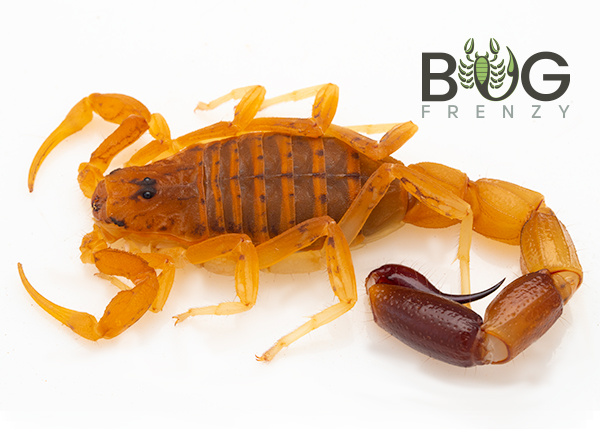
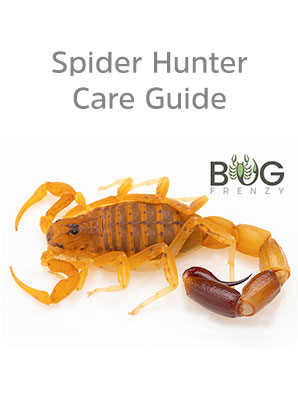
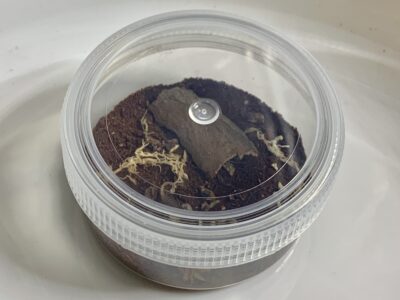
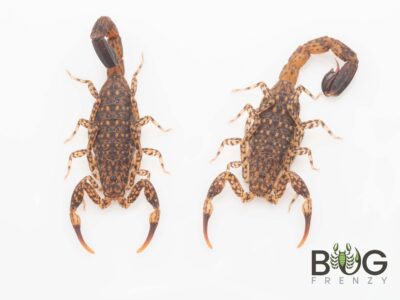
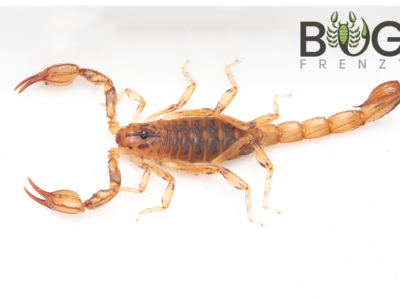
Jason Melide (verified owner) –
Definitely value for money. Very impressed with the kits to.
Michael Lun (verified owner) –
This scorpion is a beautiful large species of scorpion lovely specimen of Isometroides this species is my new favorite species thanks once again bug frenzy for excellent customer service and super fast shipping 10 out of 10 would recommend you buy from bug frenzy I will be sure to buy again soon.
josh anderson (verified owner) –
trevor k. (verified owner) –
Very happy with my purchase
Chris (verified owner) –
The Spider hunter scorpion is a great little animal very quick and docile
James (verified owner) –